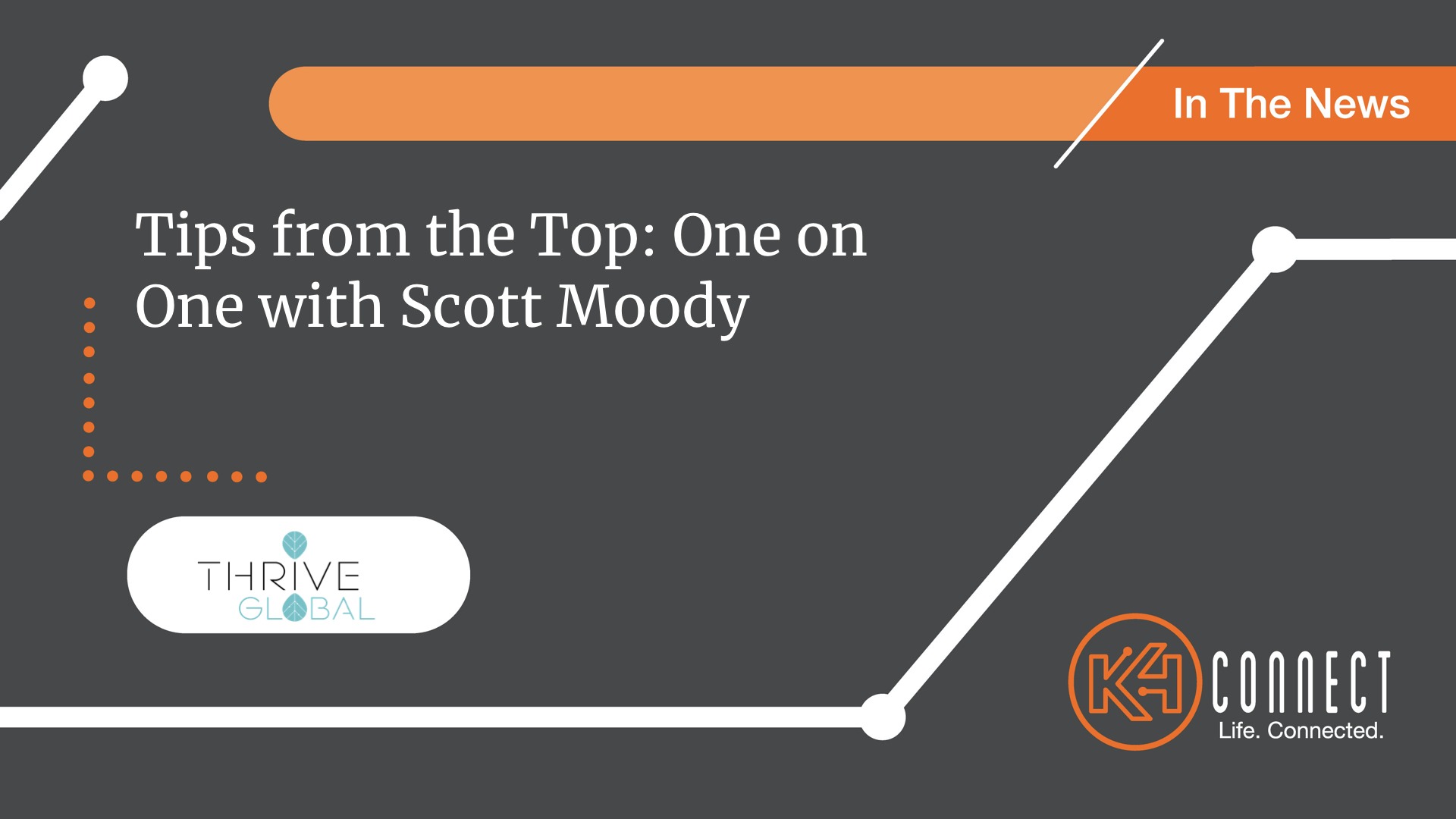Almost any definition of leadership will include honesty and integrity as being essential, and while true, I tend to think another particularly critical element for the entrepreneur is to recognize is that they are a member of a much larger team.
By: Adam Mendler
November 7, 2019
I spoke to Scott Moody, CEO of K4Connect, about his journey and best advice.
Adam: Thanks again for taking the time to share your story and your advice. First things first, though, I am sure readers would love to learn more about you. What is something about you that would surprise people?

Scott: I am not sure there is much left to tell since I am a pretty open book and often share thoughts both liberally and publicly as a way of working through ideas, although that’s likely not a wise trait in today’s day and age! Given my propensity to talk a lot and having never finished a talk or speech in the allotted time, most folks would find it hard to believe I am a bit of an introvert. Honestly, I am uncomfortable around crowds and if in one, hide to the side or cling to the few folks I do know. While I often speak on stage in front of hundreds of people, I don’t really mingle that well when I am off the stage. I am not what some would call a “glad-hander”, nor am I not much for going out. I’d much rather be at home with my wife and daughters (when they are home, or we are visiting them).
Adam: How did you get here? What failures, setbacks or challenges have been most instrumental to your growth?
Scott: First, I don’t really subscribe to this whole idea of failure. Ideas fail, products fail, companies fail, I’ve even been to entire countries that have failed, but you only fail if you give up. Otherwise, it’s just an experience, and believe me, I have a whole lot of experience!
Of course, when you are going through whatever issue you are going through, it can certainly feel like a failure at the time and it’s certainly no fun, but I don’t ever really look back with regret. With time, I look at each event as a valuable experience that hopefully has made me a better person, husband, father, friend, leader. Mind you not great, or even good, but just better.
There are far too many of these “experiences” to relay here but let me just offer one. A few years ago, not long after we started K4Connect, I was diagnosed with a brain tumor. It was benign, but the operation and recovery were more difficult, and longer, than thought. It was certainly no fun, and quite painful, yet as I look back at that time now, I really consider it a blessing. It is one thing to be empathetic to those we serve at K4Connect, but a whole other thing to walk, or for a few weeks not walk, in their shoes. Moreover, as I went through the various challenges I experienced, I just kept thinking, “what does a poor person do?”. I had a caregiving wife, I had insurance, I had money, but what would have happened had I not, who would have been there to help? I kept thinking what it would have been like for my Dad. While he had a caregiving and loving wife, they did not have insurance and had very little in terms of money. I’m sure he would have recovered, but very likely not as well, certainly not as fast and would have been even worse off financially. There is no doubt that experience helped shape me and our company, serving those that are so often both technologically and economically underserved.
Adam: In your experience, what are the defining qualities of an effective leader? How can leaders and aspiring leaders take their leadership skills to the next level?
Scott: People often misunderstand the difference between management and leadership. A good manager effectively sees a project through, while a good leader is someone who can inspire and motivate others to a common goal. Companies can edict who are the managers in a company, but leadership is something earned. Almost any definition of leadership will include honesty and integrity as being essential, and while true, I tend to think another particularly critical element for the entrepreneur is to recognize is that they are a member of a much larger team. It seems to me that too many entrepreneurs today focus more on self-promotion than that of their company or other team members.
In my own case, I can remember when the iPhone 5S came out, the first with the Touch ID. There were tons of articles on the technology, often referring to me as the inventor (I was not), the founder (I was one of the two co-founders) or referring to AuthenTec as “my” company (I was one member of a much larger team). I found it all very embarrassing, eventually writing a blog post titled, “Startup CEO’s Get Too Much Credit for What is a Team Sport”. You can say what you want about how good Tom Brady is, but there are a ton of coaches, teammates and others off the field that help make that happen. So, let me make this clear to every aspiring entrepreneur (and remind some existing ones) – you’re worthless by yourself.
Adam: What are your three best tips applicable to entrepreneurs, executives and civic leaders?
Scott: You need to really and truly understand those you serve to see and solve problems others may not fully recognize. It is the difference between a manager and a leader, incremental improvements and innovative solutions, 280-character tweets and nuanced strategies. It’s not simply asking a few people what they think. Instead it takes an in-depth understanding, it takes an empathetic walk in their shoes, it takes learning from how others failed, it takes experience. And the best way to do that all quickly – have a good team.
Don’t just follow, don’t believe the hype. Everyone follows. In dot-com era it was all about “eyeballs”, until one day it wasn’t. More recently, it was all about raising bazillions like WeWork or Uber with the idea of owning the market, until one day it wasn’t. Fact is that it takes a really long time to be an overnight success. In the end, creating real profits counts, creating real value matters.
Do something that matters. It’s not about just making money. Sure, there has to be market, people willing to pay, but the fact is that you have a far greater responsibility than just making money, including your team (the ones that trusts you care about them too), your customers (the ones that are making a commitment to some little puke company no one ever heard of), your community (where your team and customers live), and your investors (the ones that took a bet on your idea to start). They are all responsible for making your company a success, so that success does not all belong to you – either egotistically or financially.
Adam: What is the single best piece of advice you have ever received?
Scott: Ok, this may sound stupid, since this is supposed to be about startups, but the most important piece of advice I ever received wasn’t actually a piece of advice, it was more about what I saw, what I felt. My parents struggled financially most of their lives, did not always have an easy life and I can assure you that when I was a teenager, I certainly did not make it any easier especially for my Dad. Yet no matter what, no matter what he was going through personally, no matter what I may have done, no matter how much I may have thought I hated my Dad, no matter how many times he did not particularly like what I did – or maybe even like me very much – there was not one moment in my life that I did not know he loved me. Not one. I’ve tried to be the same kind of person myself. Look, Moody is not a wholly inappropriate last name, but I love my family, I love the people I work with, I love the people we serve. Not all in the same way, and maybe I’m not that good at showing it at times, but I do and the example my father set for me was the best advice I’ve ever received.
Click here to continue reading on Thrive for more insights from Scott!

